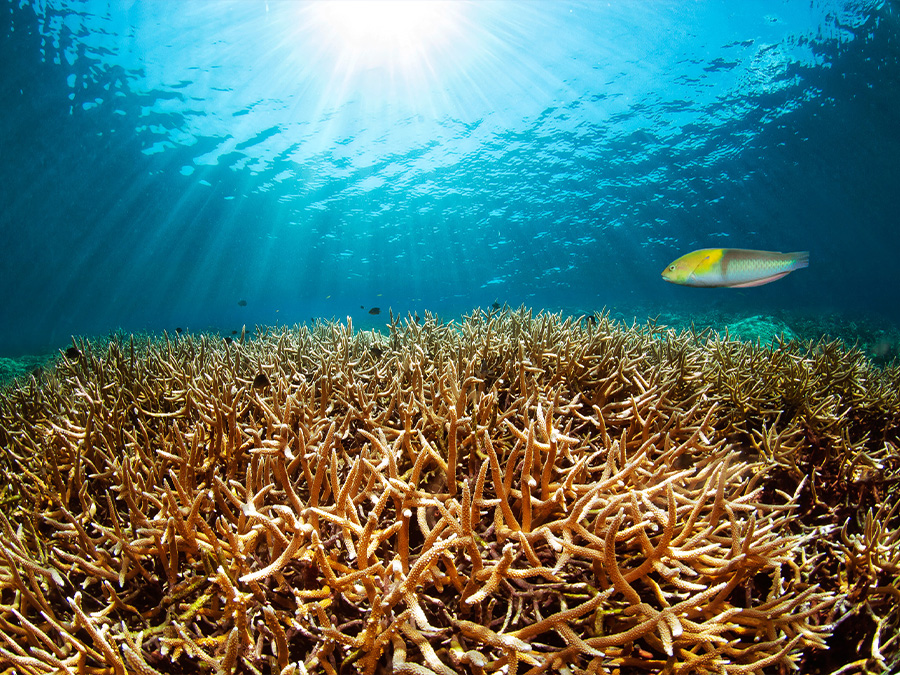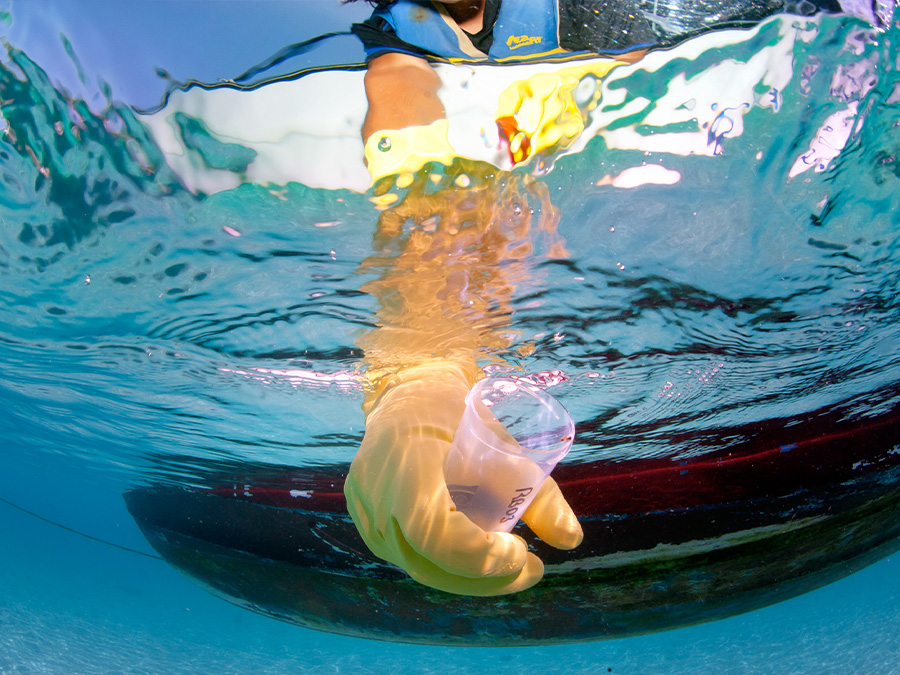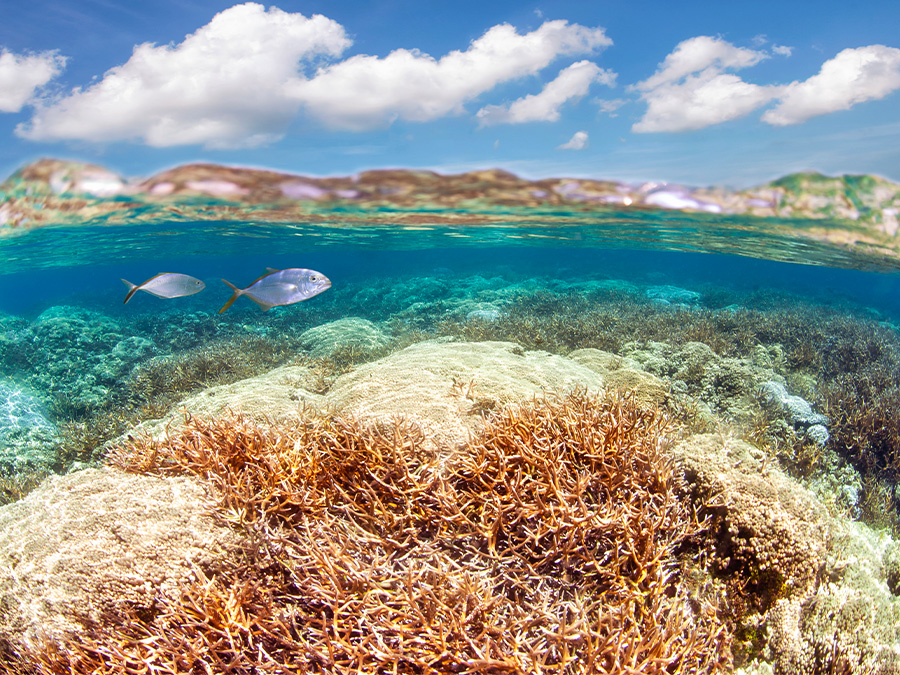In a heartbreaking turn of events, two large coral reefs off the coast of Honduras as well as other reefs in the Caribbean have fallen victim to the destructive forces of coral bleaching, a consequence of warming waters due to climate change. The catastrophic damage of these vibrant and biodiverse ecosystems underscores the urgent need for immediate action to protect and restore our oceans.
The dangerous combination of rising ocean temperatures and poor water quality has led to widespread coral bleaching, presenting significant challenges to Cordelia Banks, a protected area off the SouthWest coast of Roatan in the Bay Islands, as well as Capiro in Tela off the North coast of Honduras. Coral bleaching occurs when corals expel the symbiotic algae living in their tissues, causing the loss of their vibrant colors and weakening their ability to survive. Corals can bounce back from bleaching events, especially if they are healthy and the environmental stressors are alleviated in time.
These once-thriving reefs, teeming with life and biodiversity, now highlight the pressing challenges climate change poses to our planet’s delicate ecosystems. The Coral Reef Alliance (CORAL) and our partners stand at the forefront of the battle, leveraging 30 years of expertise and unwavering commitment to coral reef conservation. Together, we’re dedicated to not only addressing these challenges but also to revitalizing and restoring the vibrancy and biodiversity of these essential marine habitats.

Critical Work for Coral Reefs
With our commitment to preserving these underwater wonders, CORAL emphasizes the importance of acting swiftly to prevent further damage to neighboring reefs. Our team and partners focus heavily on reducing stressors to the reef, including securing clean water and implementing sustainable fishing practices, to give corals a better chance of survival in warming waters.
I’ve lived alongside these reefs most of my life, so to see this devastation first-hand is heartbreaking. We need all hands on deck to swiftly reduce local threats to allow coral reefs to adapt to climate change. The most important local actions needed are to eliminate sewage pollution, increase protection, and implement effective management measures to restore the ecosystem so it can adapt to more challenges ahead.
Jenny Myton, Conservation Program Director
Now, more than ever, we call on individuals and organizations to contribute to our cause and accelerate the expansion of our efforts to reduce threats of wastewater pollution in Tela, Coxen Hole, and other emblematic sites across the Western Caribbean. The time to act is now, as we witness first-hand the window of opportunity to safeguard these precious ecosystems rapidly closing.

Our Response Plan
Immediate Actions for Reef Conservation
First and foremost, our focus is on understanding the full impact. We’ve partnered with the Healthy Reefs Initiative (HRI) to apply the Atlantic and Gulf Rapid Reef Assessment (AGRRA) for past studies and will join forces with them again to assess the ecological impacts and reef health monitoring in emblematic sites across the Mesoamerican Region. We’re also delving into the social and economic impacts, exploring potential partnerships to broaden our insights.
When it comes to interventions, we’re identifying both short-term and long-term solutions, such as promoting sustainable tourism best practices to reduce pressure, supporting sustainable fisheries, and effective enforcement within the MPAs, as well as collaborating closely with the Bay Islands National Marine Park Technical Committee (BINMP-TC) and the Tela Inter-Institutional Environmental and Protected Areas Committee (CIAT) to continue assessing the situation and planning joint next steps.
Communication is key. We’re keeping decision-makers and local communities in the loop with briefings and clear information. Feedback from our team on the ground and in the water will be critical to sharing updates.

Next Steps for Coral Reef Resilience
Once we’ve assessed the situation, we’ll enact next steps to maximize resilience. This will include more effective management of Marine Protected Areas (MPAs), like providing technical assistance to local stakeholders, capacity building, and funding MPA co-managers to implement their critical programs.
On the local front, we’re teaming up with partners like The Bay Islands Conservation Association (BICA) and Tela Reef Friend’s Association (AMATELA) to tackle local sanitation issues through water quality monitoring. We are working alongside local organizations in creating budgets and fundraising to make sanitation management models a reality. The goal is to have these models adapted to different coral reef communities around the world. Tools to replicate these adaptable and scalable management models will be publicly available this summer. Click here to be notified when this toolkit is available. (link to a sign-up page)
And, of course, we can’t forget about the reefs themselves. Simultaneously, we’re supporting the enforcement of MPA regulations and safeguarding fisheries by partnering with the Roatan Marine Park (RMP) and the Foundation for the Protection of Lancetilla, Punta Sal and Texiguat (PROLANSATE) to ramp up patrols. RMP and Bay Islands Conservation Association (BICA), lead efforts to identify restoration methods for the damaged reefs, which complement our priorities to address wastewater and fisheries. Collectively we’re actively looking into what research is needed to ensure we’re making all the right moves.
Strengthening the Future through Research and Capacity Building
Collaborating with experts to fill information gaps related to sanitation, coral health, and water quality is a priority. We’re building capacity for MPA co-managers, ensuring we have the knowledge and skills needed for effective conservation.
Empowering Change with Your Support
Our work isn’t limited to reacting to the current threats; we’re working diligently to shape a resilient future for our coral reefs and the communities that depend on them. Your support is pivotal in turning these plans into action.
So what can you do? To make a global impact, think local. Support local initiatives and conservation organizations, adjust your daily habits to include more sustainable practices, and keep learning. Then turn that knowledge into practice. Together, we can safeguard our oceans and leave a legacy of thriving marine ecosystems for generations to come.

